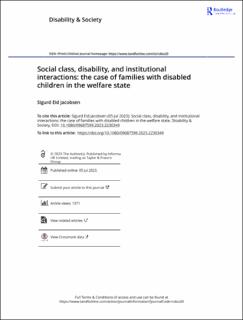Social class, disability, and institutional interactions: the case of families with disabled children in the welfare state
Peer reviewed, Journal article
Accepted version
Permanent lenke
https://hdl.handle.net/11250/3107232Utgivelsesdato
2023Metadata
Vis full innførselSamlinger
- NOVA andre dokumenter [94]
- Publikasjoner fra Cristin [3256]
Originalversjon
10.1080/09687599.2023.2230349Sammendrag
Research on families with disabled children has highlighted how
such families experience frustration in their encounters with health
and welfare services. However, less attention has been given to
how these encounters are linked to social class. This article explores
whether levels of cultural capital and family resources influence
communication with professionals among parents of disabled chil-
dren. To this end, I draw upon a longitudinal qualitative dataset of
fieldwork and interview data from families in Norway. The findings
show that middle-class parents could utilize experts, keep commu-
nication smooth, and persist in trying to secure services for their
children without any real sense of achievement to a higher degree
than working-class parents. However, neither working-class nor
middle-class parents thrived in navigating these bureaucracies. This
study has clear implications for policy and professionals in acknowl-
edging how levels of cultural capital and other family resources
influence the ability to endure and navigate welfare institutions.

